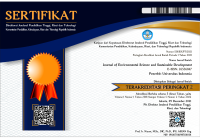Abstract
Wastewater and household trash have become serious problems in major Indonesian cities due to the lack of environmental education for children and society as a whole. This paper will examine the urban lifestyle and the processing of waste, followed by an analysis of problem-based learning (PBL) experiments in elementary schools in various cities. The analysis will be supplemented with a questionnaire distributed to the students before and after the PBL trial. The article aims to offer an alternative educational environment that will evoke maximum learning results. It has been prepared using cross-tabulation research methods for three groups: The first group is comprised of students and teachers who have studied environmental education using the PBL method and through workshop activities. The second group comprises teachers who have studied environmental education using workshop activities. The third group includes teachers and students who have studied environmental education without the PBL model or workshop activities. Using cross-tabulation, show that the proportion of respondents increased after implementation compared to before is hand both Groups A and B. Group C does not show much change after implementation. From this study, authors conclude that groups using the PBL learning model with workshops showed significant changes in knowledge aspects.
References
Aitken, L. (2019). Teacher perspectives on using project-based learning. Teacher Magazine.
https://www.teachermagazine.com.au/articles/teacher-perspectives-on-using-project-based-learning
Akçay, B. (2009). Problem-based learning in science education. Journal of Turkish Science Educcation, 6(1), 26–36.
https://www.pegem.net/dosyalar/dokuman/48116-20090429114931-04problem-based-learning-in-science-education.pdf
Aldabbus, S. (2018). Project-based Learning: Implementation & Challenges. International Journal of Education, Learning and Development, 6(3), 71-79.
https://www.researchgate.net/publication/328368222
Ballantyne, R. R., & Packer, J. M. (2010). Teaching and Learning in Environmental Education: Developing Environmental Conceptions. The Journal of Environmental Educucation, 27, 25–32.
https://doi.org/10.1080/00958964.1996.9941455
Bjorge, S., Hannah, T., Rekstad, P., & Pauly T. (2017). The Behavioral Effects of Learning Outdoors. USA: Sophia The St. Catherine University.
https://sophia.stkate.edu/maed/232/
BPS Kota Bandung. (2020). Jumlah dan Laju Pertumbuhan Penduduk di Kota Bandung, 2014-2018.
https://bandungkota.bps.go.id/statictable/2020/07/06/687
BPS Kota Batu. (2018). Jumlah Penduduk dan Laju Pertumbuhan Penduduk Menurut Kabupaten/Kota di Provinsi Jawa Timur, 2010, 2015, dan 2016.
https://batukota.bps.go.id/statictable/2018/12/10/292/jumlah-penduduk-dan-laju-pertumbuhan-penduduk-menurut-kabupaten-kota-di-provinsi-jawa-timur-2010-2015-dan-2016.html
BPS Kota Malang. (2019). Jumlah Penduduk di Kota Malang Menurut Kecamatan dan Jenis Kelamin, 2011-2020.
https://malangkota.bps.go.id/dynamictable/2019/05/15/19/jumlah-penduduk-di-kota-malang-menurut-kecamatan-dan-jenis-kelamin-2011-2020.html
Bušljeta, R. (2013). Effective Use of Teaching and Learning Resources. Czech-polish historical and pedagogical journal, 5(2).
https://doi.org/10.2478/cphpj-2013-0014
Cutter-Mackenzie, A., & Edwards, S. (2013). Toward a Model for Early Childhood Environmental Education: Foregrounding, Developing, and Connecting Knowledge Through Play-Based Learning. The Journal of Environmental Education, 44, 195–213.
https://doi.org/10.1080/00958964.2012.751892
Delisle, R. (1997). The Teacher’s Role in Problem-Based Learning. In How to Use Problem-Based Learning in the Classroom. ASCD.
EPA. (n.d.). What is Environmental Education?.
https://www.epa.gov/education/what-environmental-education
Force, J. E., Seliga, T. A., & Swain, R. W. (2010). A Community Environmental Education Program on Air Quality. Journal of Environmental Educaction, 8(3), 32–39.
https://eric.ed.gov/?id=EJ162914
Franzen, R. L. (2018). Environmental education in teacher education programs: Incorporation and use of professional guidelines.
http://www.susted.com/wordpress/content/environmental-education-in-teacher-education-programs-incorporation-and-use-of-professional-guidelines_2018_01/
Genc, M. (2015). The project-based learning approach in environmental education. International Research in Geographical and Environmental Education, 24, 105–117.
https://doi.org/10.1080/10382046.2014.993169
Indrawan, E., Jalinus, N. & Syahril. (2018). Review Project Based Learning. International Journal of Science and Research, 8, 1014–1018.
https://doi.org/10.21275/ART20196959
Ivicek, K., de Castro, A. B., Salazar, M. K., Murphy, H. H., & Keifer, M. (2011). Using Problem-Based Learning for Occupational and Environmental Health Nursing Education. AAOHN Journal, 59, 127–133.
https://doi.org/10.1177/216507991105900305
Kazemi, F., & Ghoraishi, M. (2012). Comparison of Problem-Based Learning Approach and Traditional Teaching on Attitude, Misconceptions and Mathematics Performance of University Students. Procedia - Social and Behavioral Sciences, 46, 3852–3856.
https://doi.org/10.1016/j.sbspro.2012.06.159
Kokotsaki, D., Menzies, V., & Wiggins, A. (2016). Project-based learning: A review of the literature. Improving Schools, 19(3), 267–277.
https://doi.org/10.1177/1365480216659733
Louv, R. (2005). Last Child in the Woods: Saving Our Children from Nature-Deficit Disorder.
http://richardlouv.com/books/last-child/
Kudryashova, A., Gorbatova, T., Rybushkina, S., Ivanova, E. (2015). Teacher’s Roles to Facilitate Active Learning. Mediterranean Journal of Social Sciences, 7(1).
https://doi.org/10.5901/mjss.2016.v7n1p460
McCarthy, J. (n.d.). 3 Common PBL Problems—and Solutions. Edutoppia.
https://www.edutopia.org/article/3-common-pbl-problems-and-solutions
Mukani, M., & Sumarsono, T. (2017). Pendidikan Karakter Peduli Lingkungan Berbasis Adiwiyata pada Mata Pelajaran Fiqih di MTsN Tambakberas Jombang. Jurnal Pendidikan Agama Islam (Journal of Islamic Education Studies), 5(2), 181–200.
https://doi.org/10.15642/jpai.2017.5.2.181-200
National Library of Medicine. (n.d.).
https://www.nlm.nih.gov/
NEEF. (n.d.). Environmental Project-Based Learning.
https://www.neefusa.org/environmental-project-based-learning
Rachman, I., Matsumoto, T., & Yustiani, Y. M. (2015). Influence of Parent’s Behavior to the Children Awareness on the Environmental Preservation. Journal Sampurasun, 1(1).
https://doi.org/10.23969/sampurasun.v1i1.22
Savin-Baden, M. (2020). What Are Problem-Based Pedagogies?. Journal of Problem-Based Learning, 7(1), 3-10.
https://doi.org/10.24313/jpbl.2020.00199
Short, P. C. (2009). Responsible Environmental Action: Its Role and Status In Environmental Education and Environmental Quality. The Journal of Environmental Education, 41, 7–21.
https://doi.org/10.1080/00958960903206781
Silva, E. C., Correia, A., De Almeida, F., & Monteiro, S. (2019). It's Mathematics!: A Modelling Day to Develop Real-World Problem Solving. ICERI2019 Proceedings, 6226-6231.
https://doi.org/10.21125/iceri.2019.1500
The Growing Room. (n.d.). The Importance of Environmental Education.
https://thegrowingroom.org/announcements/the-importance-of-environmental-education
Vasconcelos, C. (2012). Teaching Environmental Education through PBL, Evaluation of a Teaching Intervention Program. Research in Science Education, 42, 219–232.
https://doi.org/10.1007/s11165-010-9192-3
Recommended Citation
Rachman, Indriyani; Sugimaru, Chika; and Matsumoto, Toru
(2020).
USE OF PROBLEM-BASED LEARNING (PBL) MODEL TO IMPROVE LEARNING OUTCOMES IN ENVIRONMENTAL EDUCATION.
Journal of Environmental Science and Sustainable Development, 3(1), 114-141.
Available at: https://doi.org/10.7454/jessd.v3i1.1039
Included in
Educational Methods Commons, Life Sciences Commons, Social and Behavioral Sciences Commons






